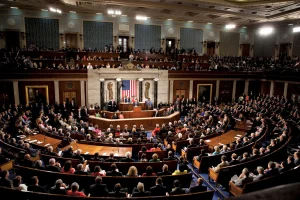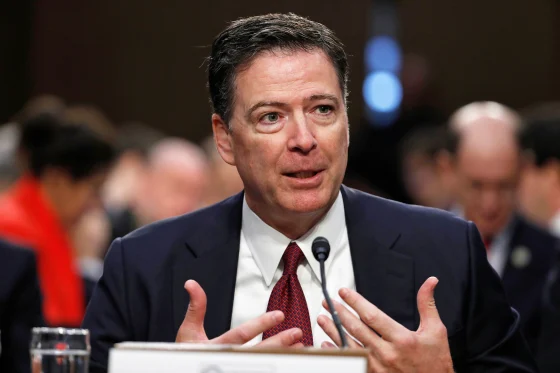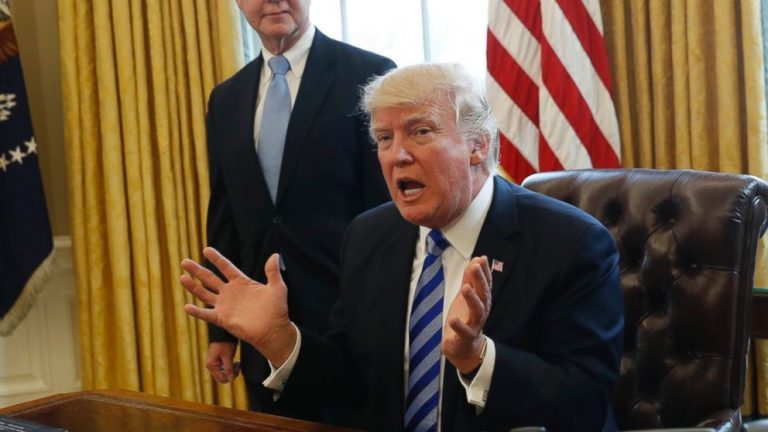A federal judge has thrown out the criminal cases brought against two prominent public officials, ruling that the appointment of the prosecutor who brought the indictments was legally invalid. The decision abruptly halts the proceedings against former FBI Director James Comey and New York Attorney General Letitia James, two figures whose cases had garnered intense national attention.
Although the charges have been dismissed, the ruling was issued without prejudice, meaning the Department of Justice can seek new indictments if it chooses to do so—provided they are brought by a properly appointed prosecutor. The decision immediately triggered sharp reactions from legal experts, federal officials, and critics on both sides of the political divide, fueling an already heated debate over the motivations, legality, and consequences of the cases.
The judge’s ruling marks one of the most dramatic turns yet in a saga that has been unfolding for months, centered not only on the defendants themselves but on a broader clash over the independence of the Justice Department and the scope of presidential influence over prosecutorial decisions. While the ruling did not address the underlying merits of the accusations, it zeroed in on a fundamental question: whether the special U.S. attorney appointed to pursue the charges had been legally empowered to do so.
A Case Built on Controversial Appointments
The cases were brought by U.S. Attorney Lindsey Halligan, who had been tapped for the role earlier this year. Her appointment drew substantial scrutiny from the moment it was announced, in part because she had no prior experience as a federal prosecutor. Critics argued she was chosen for political loyalty rather than professional qualifications; supporters countered that she was entitled to assemble her own leadership team and pursue investigations as she saw fit.
Ultimately, it was the method of her appointment—not her background—that became the focal point of the judge’s decision. In dismissing the indictments, the court found that Halligan’s elevation to U.S. attorney did not comply with statutory requirements, rendering her prosecutorial actions invalid. Because she lacked lawful authority, any indictments she obtained were similarly tainted.
This procedural flaw, in the judge’s view, was severe enough to require that the charges be dismissed. Legal analysts noted that such rulings are rare but not unheard of, and they often reflect concerns about maintaining clear boundaries around federal prosecutorial power.
Dismissed, but Not Over
Despite the dismissal, the door remains open for the Justice Department to revisit the charges. Legal observers immediately pointed out that “without prejudice” is a crucial designation: rather than terminating the cases entirely, it pauses the process and gives prosecutors the option to present the allegations again to a grand jury—so long as a properly authorized official leads the effort.
For now, however, the result is a striking pause in two cases that had become emblematic of broader political battles.
Comey’s Case: False Statements and Obstruction Allegations
The now-dismissed charges against James Comey stemmed from accusations that he knowingly made false statements and obstructed a congressional proceeding during his 2020 testimony before the Senate Judiciary Committee. Comey had entered a not-guilty plea in October.
The charges were brought amid a wave of criticism from detractors who accused him of mishandling politically sensitive investigations during his tenure at the FBI. Supporters argued that the charges were an outgrowth of ongoing political vendettas.
Vice President JD Vance defended the prosecution effort earlier this year, asserting that the cases were “driven by law and not by politics.” The dismissal, however, sidesteps those arguments entirely, focusing instead on Halligan’s authority—or lack of it.
Letitia James’ Case: Allegations of Mortgage Fraud
New York Attorney General Letitia James was also swept into the controversy when she was indicted on charges related to a property she purchased in 2020. Prosecutors alleged she misrepresented the home as a second residence rather than an investment property in order to secure a more favorable mortgage rate.
James denied any criminal impropriety and pleaded not guilty in October. She argued that she purchased the home for her great-niece and had allowed family members to live there rent-free. She has long been a high-profile figure due to her prominent legal clashes with the Trump administration, including a civil fraud case she successfully brought against Trump last year.
The allegations surrounding her property were sharply contested even before the dismissal, with her legal team arguing that the case relied on misinterpretations of routine mortgage documentation. As with Comey, the judge’s ruling ends the proceedings for now but leaves the possibility of future charges on the table.
A Prosecutor Under Fire
Lindsey Halligan’s role has been central to both cases. Appointed as U.S. attorney for the Eastern District of Virginia after Trump removed her predecessor, Halligan moved quickly to pursue the indictments—despite reported objections from career prosecutors within the department.
Sources familiar with the matter said former U.S. attorney Erik Siebert, who was ousted earlier this year, had resisted bringing the cases. Halligan proceeded regardless and obtained indictments after a pointed social-media post from the president calling on Attorney General Pam Bondi to take swift action against Comey, James, and Rep. Adam Schiff.
Halligan and DOJ officials have recently begun publicly criticizing the judge’s handling of the case, signaling that tensions between the bench and prosecutors may escalate further.
Political and Legal Fallout
The dismissal has sparked renewed debate over prosecutorial independence and the boundaries of executive influence. Supporters of the defendants argue that the cases should never have been brought in the first place and that the judge’s ruling reflects deeper issues with politically motivated prosecutions. Critics, meanwhile, insist that the allegations remain serious and deserve a full hearing before a properly convened grand jury.
Legal analysts suggest that the Justice Department now faces significant decisions. Re-filing the charges could draw renewed criticism and prompt accusations of politicization; declining to pursue them might fuel claims of leniency or bias.
At the same time, the DOJ must determine how to address the judge’s concerns surrounding Halligan’s appointment. If future prosecutions are to proceed, the department will need to ensure that the legal authority of all involved officials is beyond question.
A Case That Could Reshape DOJ Procedure
The ruling may also have broader implications beyond the immediate cases. Experts note that challenges to the legitimacy of federal appointments are not uncommon, but successful ones can have ripple effects throughout the department—requiring reviews of past actions and possibly prompting procedural reforms.
Some observers predict that the Justice Department may soon introduce new guidelines to prevent similar disputes from arising in future high-profile cases.
What Comes Next
For now, the dismissal does not resolve the underlying allegations but instead presses pause on two politically charged prosecutions. The Justice Department has not yet announced whether it will seek new indictments.
With both supporters and critics eagerly awaiting the next steps, the cases remain in a state of uncertainty. The judge’s ruling has introduced significant legal obstacles, but it has not ended the controversies surrounding either figure.
This story continues to develop, with many expecting additional filings, statements, and legal maneuvers in the coming days.

Emily Johnson is a critically acclaimed essayist and novelist known for her thought-provoking works centered on feminism, women’s rights, and modern relationships. Born and raised in Portland, Oregon, Emily grew up with a deep love of books, often spending her afternoons at her local library. She went on to study literature and gender studies at UCLA, where she became deeply involved in activism and began publishing essays in campus journals. Her debut essay collection, Voices Unbound, struck a chord with readers nationwide for its fearless exploration of gender dynamics, identity, and the challenges faced by women in contemporary society. Emily later transitioned into fiction, writing novels that balance compelling storytelling with social commentary. Her protagonists are often strong, multidimensional women navigating love, ambition, and the struggles of everyday life, making her a favorite among readers who crave authentic, relatable narratives. Critics praise her ability to merge personal intimacy with universal themes. Off the page, Emily is an advocate for women in publishing, leading workshops that encourage young female writers to embrace their voices. She lives in Seattle with her partner and two rescue cats, where she continues to write, teach, and inspire a new generation of storytellers.









